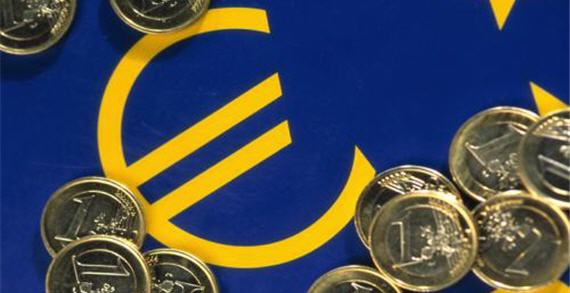
IMF managing director Dominique Strauss-Kahn today said that, while he did not believe the euro was at risk, the EU must take a more “comprehensive, integrated” plan rather than the current "piecemeal approach."
These remarks, FT reports, come the day after a meeting with EU finance ministers yielded only frustration, with officials "divided over the two most high-profile proposals, increasing the size of the €440bn eurzone rescue fund or a joint Italy-Luxembourg plan to create a European bond that would enable struggling countries to borrow at lower rates."
Add Barry Eichengreen, a Berkeley economist and former senior policy advisor at the IMF, to the list of those unimpressed with the EU’s leadership. He dubs the rescue package for Ireland "a disaster" and chirps, "You can say one thing for the European Commission, the ECB, and the German government – they never miss an opportunity to make things worse." He adds, "I’m probably the most pro-euro economist on my side of the Atlantic. Not because I think the Eurozone is the perfect monetary union, but because I have always thought that a Europe of scores of national currencies would be even less stable. I’m also a believer in the grand European project. But given this weekend’s abject failure of EU and German leadership, I am going to have to rethink my position."
He believes the plan enacted "simply kicks the can down the road" and, far from solving the problem, will add to it by creating an "inevitable populist backlash." And cutting wages will create a vicious cycle, in that it will have to be followed by tax hikes to maintain public revenue streams. Instead, "A bright red line could have been drawn between the third of the government debt that guarantees the obligations of the banks, on the one hand, and the rest of the government’s debt, on the other hand. The third representing the debts of the Irish banking system could have been restructured." The last is a euphemism, indeed, in that he offers that "Bondholders could have been offered 20 cents on the euro" if not simply "been wiped out."
George Mason economist Tyler Cowen argues that no rational alternatives were politically feasible given the divergent views in the weak and strong states. Simply put, "The Germans fear that if Ireland pulls the plug on the bailout deal, some of the other PBIIGS will meet immediate financial crises, and that spills over onto both German lending banks and Germany as the country holding the eurozone together. Ireland feels that if it pulls the plug on the bailout deal, the Germans don’t lend enough support and a) they lose what’s left of their banking system, and b) their next government bond auction goes very, very badly."
Daniel Gros, director of the Centre for European Policy Studies, sees a very real thing of the situation spiraling out of control owing to "the risk of a vicious circle under which a country that has only a manageable problem might be forced into an EFSF (ESM) programme, which would then make debt service more onerous because of the punitive interest rates. This is likely to induce investors to sell the longer-term debt of the country, which would in turn increase the pressure on the country to accept an EFSF program."
His solution is drastic: "The only way out seems to be a big bang; to deal with all the problem cases in one go." He dismisses out of hand fears of contagion, which he contends are "already a fact of life." But, to minimize problems, the European Council should "deal with all the problem cases in one go," negotiating arrangements with the creditors of all the countries in peril in a single meeting.
While allowing that "Muddling through is more attractive in the short run," he reasons that "it does not lead anywhere when doubts about debt sustainability persist and the market has been destabilised by the announcement that the loans of the new permanent crisis mechanism would be senior to private creditors. Restructuring will become virtually impossible once the Greek and Irish programs have run their course."
Spiegel, in an ongoing series on "What Europe Should Do about the Euro Crisis," begins by noting, "The euro has never been popular with Germans. But now that they might have to atone for the financial sins of other EU countries, the number of euroskeptics has been swelling dramatically." But, complaints aside, the unsigned piece acknowledges that the options are few. For one thing, "you can’t liquidate a country. Unlike the equipment or real estate of a company, a country’s assets can’t be turned into cash." The best that can be done is a debt restructuring, such as IMF occasionally does with collapsing states in the developing world, but that’s a distasteful remedy in the EU. The piece finally settles on essentially the Merkel plan: Forcing creditors to "take a haircut," eating a portion of the losses as a penalty for taking bad investment risks.
The Economist goes further, offering a guide on "How to resign from the club," leaving the Eurozone altogether and returning to one’s national currency. They note that there are good reasons for both the very strong and very weak states to wish to do this, freeing themselves, respectively, from the burden of propping up lesser economies and centralized rules precluding taking action necessary to save the domestic economy that would be unacceptable to the larger group. The necessary logistics described, however, are daunting, indeed. And seemingly aimed at a cautionary tale: "[B]y believing that a break-up cannot happen, the euro zone’s authorities will always tend to stop short of the radical measures needed to hold the project together. Given the likely and devastating chaos, it would be a mistake for a country to choose to leave. But mistakes occur in times of stress. That is why some are beginning to contemplate the unthinkable."
James Joyner is managing editor of the Atlantic Council.
Image: euros_2.jpg
